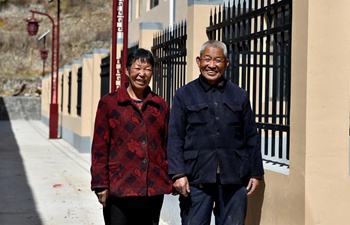WASHINGTON, April 16 (Xinhua) -- American researchers have revealed a way to zero in on and kill prostate cancer tumors in mice while leaving healthy tissue unscathed, using chemotherapy along with aptamers.
The finding, published on Monday in the journal Proceedings of the National Academy of Sciences, suggested that aptamers, lab-made molecules that function like antibodies, could form the basis of new cancer therapies if additional studies in animals and humans bear out.
"The benefit of aptamers compared to antibodies is that we have more control over where they go and what they do," said the paper's senior author Bruce Sullenger, professor in the departments of Surgery and Pharmacology and Cancer Biology at Duke University.
Sullenger's team proved that man-made aptamers can be created to target cancer cells, much like the body's naturally generated antibodies home in on pathogens such as viruses or bacteria.
Previous drug advances have used antibodies in conjunction with chemotherapy to create immunotherapies that successfully fight cancer. But inflammation and other side effects are common in these drug combinations, because it's difficult to control where and how strongly the antibodies trigger immune responses outside of the cancer cells.
Now, aptamers are increasingly being studied as good alternatives. They are created using single RNA or DNA strands, which have the same targeting potential as antibodies, but appear to be nontoxic.
In their study on prostate cancer cells, the researchers focused on an RNA ligand called E3, which selectively targets prostate cancer cells.
They combined the E3 aptamer with a small dose of a highly toxic chemotherapy agent and injected the combination in mice that harbor human prostate cancer tumors.
Mice with prostate cancer tumors receiving the investigational treatment lived up to 74 days, compared to 46 days for mice that did not receive the treatment.
Also, the researchers developed an antidote to block toxicity from the E3 aptamer-drug conjugate, providing a safety switch in the unexpected event of normal cells being killed.
"In our study, we also developed an antidote that shuts down the aptamer almost immediately, and this is an advantage if, for whatever reason, there might be an adverse reaction," said Sullenger.
"They are single strands of RNA, they can be reversed by using a complimentary portion of RNA that will bind and make a double strand to unfold the aptamer," said Bethany Powell Gray, a senior research associate at Duke, and the paper's lead author.
The researchers said studies will continue in animals and be tested in other types of cancer.
"This study demonstrates that E3 RNA selectively internalizes into prostate cancer cells and that E3 plus highly toxic drug conjugates are potent anti-tumor agents, representing a potential new therapeutic approach," Sullenger said.

















